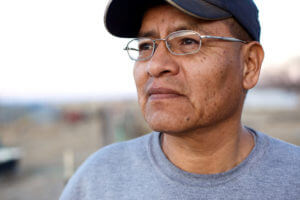
Due to the detonation of the first nuclear weapon at the Trinity test site in New Mexico in July 1945, people in and downwind of the area have suffered adverse health impacts. These individuals, known as “Downwinders,” were unknowingly exposed to high levels of radiation. Here is some information about the health impact of radiation exposure on New Mexico Downwinders.
Who Are New Mexico Downwinders?
New Mexico downwinders number in the many thousands. They lived or worked near the area of the Trinity nuclear test in July of 1945 in the state of New Mexico. Also called Trinity Downwinders, these individuals were exposed to the radioactive fallout from the nuclear explosion. Many of them lived in Native American communities near or downwind of the test site.
Besides being immediately exposed to dangerous nuclear fallout, New Mexico Downwinders also faced long-term exposure. Radioactive fallout remained in the air, water, farm animals, crops and soil for years after the test. As a result, Downwinders were at risk for developing various health issues related to nuclear fallout.
Health Impacts of Radiation Exposure
The effects of radiation exposure vary depending on several factors such as the type of radiation, dose received, duration of exposure and even individual susceptibility. For instance, radiation exposure impacts children more quickly and harshly than adults. In general, however, it can cause a vast array of serious health problems including cancer, birth defects and even damage to vital organs, such as the heart.
The Health Impact on New Mexico Downwinders
The health impact on New Mexico Downwinders has been very significant and long-lasting. The radiation exposure caused various forms of cancer such as leukemia, thyroid cancer, breast cancer and lung cancer.
It also led to other serious health issues including birth defects, developmental disabilities, stillbirths and miscarriages. These health impacts have not only affected the Downwinders themselves but also their children and grandchildren. These individuals continue to suffer from the effects of radiation exposure through genetically transmitted problems and chromosomal abnormalities.
The impact of the nuclear tests on Native American communities was especially devastating. Many Native American communities experienced marginalization and lacked access to proper healthcare. The Downwinders were not informed or warned about the potential health risks of living near the test site, leaving them unaware and unprotected from the harmful effects of radiation.
Even decades after the nuclear testing ended, the health impacts persist, and many Downwinders have not received any compensation or recognition for their suffering. The United States government has only recently acknowledged the harm caused by nuclear testing in New Mexico and other areas, but financial compensation for those affected has been minimal and difficult to obtain.
This lack of support and acknowledgement adds to the sense of injustice felt by the Downwinders community. Many Downwinders struggle with health issues they believe are the result of exposure to radiation from the tests. However, they are left to bear the financial burden alone.
The Tularosa Basin Downwinders Consortium is working with lawmakers to raise awareness of the problems of Downwinders in New Mexico and other areas of the country. They desire compensation under the Radiation Exposure Act (RECA) of 1990 which provides atomic veterans, uranium workers and other radiation-exposed groups lump sum financial awards and other benefits.
Compensation for New Mexico Downwinders
The Cancer Benefits Center for Downwinders strives with individuals to document and file claims for medical and lump sum compensation. These caring individuals also advocate for groups, such as the New Mexico Downwinders, so the public is aware of the long-term problems associated with nuclear weapons testing in the United States.
If you would like to learn more or start a claims process, call us at 1 (855) 631-7197, or ask for additional information here. You may speak with one of our trained counselors 24 hours a day, seven days a week. Call soon. We would love to be of service.
 Downwinders® Claims
Downwinders® Claims